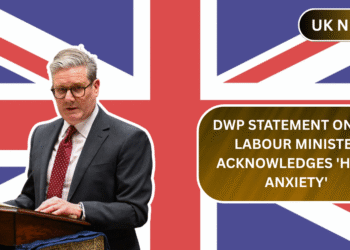The UK’s Department for Work and Pensions (DWP) has warned that pensioners may experience a significant reduction in their income next year, with the possibility of losing as much as £459 in state pension payments. This alarming news comes as the UK grapples with high inflation rates that are outpacing the state pension increase.
Soaring Inflation Puts Pressure on Pensioners
This Article Includes
The DWP has issued a cautionary notice for pensioners, outlining how rising inflation is expected to affect the state pension in 2025. With inflation continuing to climb, pensioners are likely to face a real-term cut in their payments. In the face of soaring living costs, this reduction could have a significant impact on many older citizens who depend on their state pensions to cover essential expenses.
State pensions are typically adjusted annually to keep up with inflation, but the rise in the cost of living has proven to be a challenge. The government uses the “Triple Lock” system, which increases pensions by either the rate of inflation, average earnings, or 2.5%, whichever is highest. However, inflation is currently running at much higher levels than the Triple Lock increases can match, creating a gap that will result in a reduction for pensioners.
What the £459 Reduction Means for Pensioners
This £459 reduction is the estimated gap between the state pension increase and the real cost of living in 2025. Pensioners who rely on their state pensions for daily living expenses, including food, energy bills, and healthcare, may find themselves struggling as their purchasing power diminishes. The warning from the DWP has raised concerns about the long-term impact this could have on the quality of life for pensioners, particularly those living on fixed incomes.
The UK’s inflation rate has been consistently above 10% over the past year, making it difficult for pensioners to keep up with rising costs. Although the government has attempted to soften the blow with measures such as cost-of-living payments, these one-off grants have not been enough to counteract the ongoing pressure of inflation.
Inflation’s Effect on Everyday Expenses
Inflation affects many everyday expenses for pensioners, including food, utilities, and transportation. With the cost of groceries rising at an unprecedented rate, pensioners are finding it harder to afford nutritious meals. Energy bills, which have already spiked in recent months, continue to rise, placing a strain on households that rely on pension income.
In addition, many pensioners have limited access to other sources of income, such as part-time work or business ventures, making them more vulnerable to inflationary pressures. As their pensions lose value, they may be forced to cut back on essential expenses or seek financial help from family members, charities, or social services.
Government Responses and Possible Solutions
The government has acknowledged the challenges posed by rising inflation, and several measures are being considered to alleviate the pressure on pensioners. Some have suggested that the Triple Lock system be reviewed or adjusted to account for the current economic conditions. Others have called for additional financial support, such as targeted payments or subsidies, to help pensioners cope with the increased cost of living.
Pensioner advocacy groups have also raised concerns, urging the government to do more to protect the most vulnerable members of society. They argue that the current pension increases are inadequate given the current rate of inflation and the high cost of living. While the government has promised to continue supporting pensioners, there is a growing sense of urgency to find a sustainable solution to ensure that older people can live with dignity and financial security.
The Impact on Pensioner Mental Health
The financial strain caused by the inflationary gap is not just affecting pensioners’ finances but also their mental health. Studies have shown that financial stress can lead to anxiety, depression, and feelings of insecurity, particularly among the elderly. The fear of not being able to cover basic living expenses can take a toll on emotional well-being, leading to isolation and a reduced quality of life.
Many pensioners are already feeling the effects of financial insecurity, and this latest warning about potential pension reductions has only added to their worries. The government and policymakers must consider the emotional impact of these financial cuts and work to ensure that pensioners are supported both financially and mentally.
What Pensioners Can Do to Prepare
While pensioners are faced with a challenging outlook, there are steps they can take to prepare for potential reductions in their state pension payments. One option is to explore additional sources of income, such as part-time work or rental income, if possible. Another approach is to review household budgets and look for areas where spending can be reduced, such as downsizing living arrangements or cutting back on discretionary expenses.
Additionally, pensioners can seek advice from financial advisors or local support services to understand their options and access any available benefits or financial assistance programs. It is important for older individuals to stay informed about changes in the pension system and take proactive steps to safeguard their financial future.
Conclusion
The DWP’s warning about a £459 reduction in state pensions in 2025 highlights the real impact of inflation on pensioners’ financial security. As costs continue to rise, it is crucial for the government to reassess pension policies and provide adequate support to the most vulnerable members of society. For pensioners, understanding the financial landscape and planning ahead will be key to navigating the challenges of the coming years.























